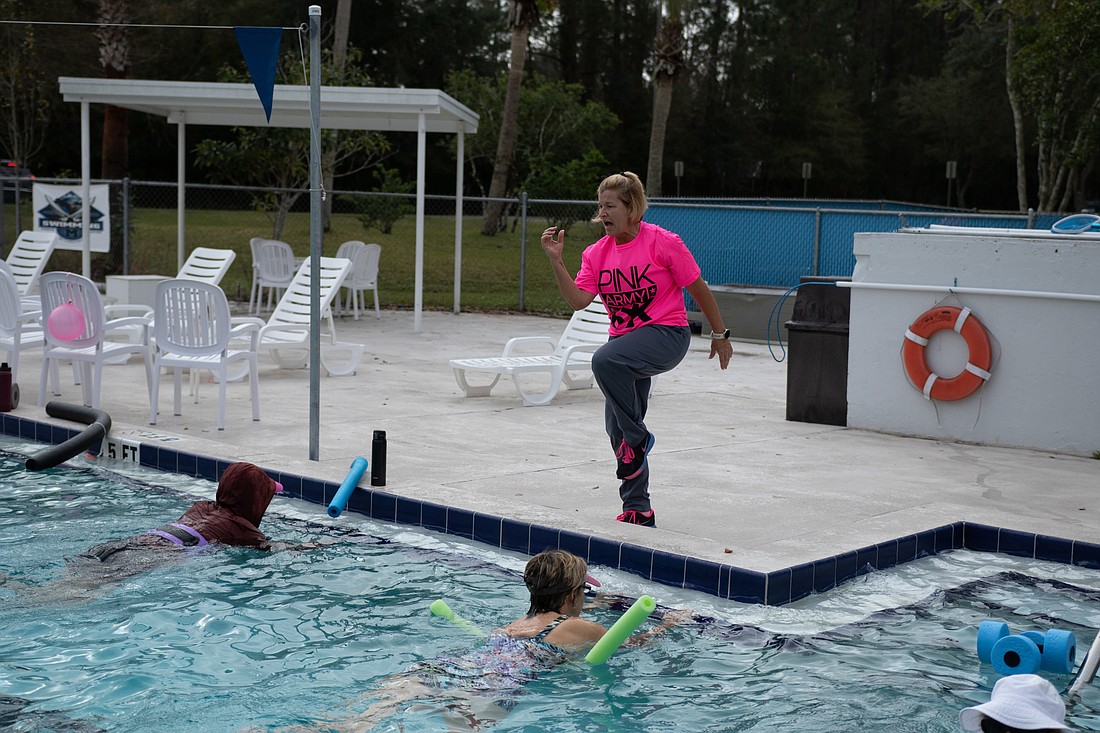- January 18, 2025
-
-
Loading

Loading

A place to train. A place to build friendships. A place to form memories. Dozens Flagler County residents who took the mic during public comment periods at the Flagler County School Board workshop and meeting Feb. 23 described the Belle Terre Swim & Racquet Club as all those things and more as they appealed to the board to do what’s necessary to keep the facility open.
"We have a beautiful piece of property. We will figure it out."
— COLLEEN CONKLIN
One of the most heartfelt appeals to protect the facility came from a true champion: Micayla Cronk, an Olympic trial qualifier whose swimming prowess has earned her multiple Florida High School Athletic Association swimming championships.
Cronk had started swimming at the Belle Terre Swim & Racquet Club when she was 7, then joined FPC’s swim team.
“I loved it — every moment of it,” she said. “Being part of a swim team provides students with unbreakable bonds, better self-esteem, self-confidence, discipline, a connection to the community, and provides a place where students can come together and be close with one another in a safe and welcoming environment.”
And scholarship opportunities, she added: Cronk won a full ride to the University of Florida.
"... If we can't financially make this work, I'm not going to sit here and tell you that I wouldn't close it down."
— TREVOR TUCKER, School Board chairman
“Swimming has brought me the chance and the opportunity to further my education at my dream college,” she said. “That wouldn’t have been possible if it wasn’t for our local swim facilities that brought me closer to the sport of swimming.”
Cronk, along with a number of other young people — some as young as elementary-school age — spoke at the evening board meeting.
By that time, the board had already heard at its 1 p.m. workshop the concerns of a procession of mostly-over-60 residents who use the facility.
The board’s concern with the facility has been, in large part, that it’s been losing money, and its mostly older user base places it outside the district’s K-12 mission: A school district can’t easily justify diverting money away from kids to pay for a facility used mostly by adults.
Some speakers tried to address those concerns directly.
“I know it’s not K-12: Most of the people are a little older,” one resident said, “but this place is a gem. If you just advertised a little more, so many people would come. ... It is a wonderful place, and I just ask from my heart: Please, think twice before you close this down. It means so much to so many people in the town.”
Several board members responded by saying the board was just looking for alternative funding arrangements for the costly facility, not looking at closing it.
Board member Colleen Conklin said she didn’t know where the perception that the board was shutting down the club was coming from.
“The conversation was never around necessarily closing,” board member Conklin said at the workshop. “The conversation was around how do we invite other partnerships to the table, since there are multiple stakeholders that are getting a benefit.”
“I don’t think anybody up here wants to take the pool away from our kids,” said board member Jill Woolbright. But, she added, “We need municipalities to help pay for a municipality pool. ... It’s really about trying to see how we can get partnerships in.”
Conklin, Woolbright and board member Janet McDonald all spoke about the prospect that the facility, in the right hands, could be transformed into a true aquatic center — potentially with an Olympic-size pool deep enough that the district’s high school swim teams could even compete there. The teams use the current pool for practice but not competition, because it isn’t deep enough for swimmers to dive off the blocks.
Conklin, Woolbright and McDonald left vague what the district’s next step would be if Palm Coast and Flagler County aren’t interested in supporting the club.
“We have a beautiful piece of property,” Conklin said. “We will figure it out.”
But board Chairman Trevor Tucker — who prides himself on championing wise use of taxpayer money — interjected.
“I’m sorry to say this to all you folks, but if we can’t financially make this work, I’m not going to sit here and tell you that I wouldn’t close it down,” Tucker said. “Financially, this has to work. Whether that’s partnering with cities, counties, whatever. ... I hope we can, but if we can’t, I’m not going to lie to anyone and tell you that I would not instantly close it down if we can’t financially afford it.”
“... Financially, we don’t create revenue,” he continued. “We’re the only governmental entity that does not create revenue. If we could create revenue and levy extra taxes, we could easily do this. But we don’t have that ability.”
He listed the financial complications: The district’s extended day care program, which usually made enough money to support other programs, hasn’t done well this year. K-12 tax dollars coming from the state have to be used for K-12-related uses.
The School Board can’t set its own tax rate — the state dictates the rate for each county, then collects money from all the counties and redistributes it according to a formula.
Tucker, summing up fellow board members’ suggestions, proposed a first step: A joint meeting with local cities and the county, in a location big enough for a large public audience.
The district administration will schedule one, Superintendent Cathy Mittelstadt said.